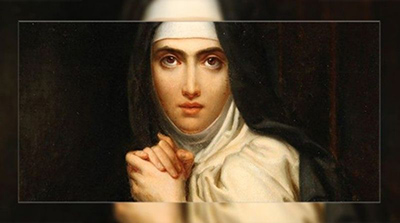On this feast of St. Teresa of Jesus it is good to remember that it was St. Paul VI who proclaimed her Doctor of the Church in 1970, being the first woman to be distinguished with this title by the Catholic Church. Then (just a week later) would come St. Catherine of Siena and, later, St. Therese of Lisieux (1997); and St. Hildegard of Bingen (2012).
There are, therefore, four women doctors out of a total of 36 who make up the complete list of those who have been recognized as "eminent teachers of the faith for the faithful of all times".
In his homily on the occasion of the doctorate of the saint of Avila, Pope Montini emphasized the particularity of this event: the first woman to be proclaimed doctor was "not without recalling the stern words of St. Paul: 'Let women keep silent in the assemblies' (1 Cor 14:34), which means even today that women are not destined to have hierarchical functions of magisterium and ministry in the Church. Has the apostolic precept been violated then? We can answer clearly: no. It is not really a question of a title that entails hierarchical magisterial functions, but at the same time we must point out that this fact in no way implies a belittling of the sublime mission of women in the bosom of the People of God. On the contrary, since she is incorporated into the Church through baptism, she participates in the common priesthood of the faithful, which enables and obliges her to "confess before men the faith which she has received from God through the Church" (Lumen Gentium 2:11). And in this confession of faith many women have reached the highest heights".
It was also Paul VI who, a few years earlier, in 1965, and curiously also on the feast of St. Teresa of Jesus, instituted the Synod of Bishops by means of the motu proprio "Apostolica Sollicitudo". It was a way of perpetuating the torrent of grace that had been the Second Vatican Council, thus providing the Church with a permanent organ of consultation that would perpetuate the spirit of the Council.

This same spirit will flutter this weekend during the opening in all our dioceses of the diocesan phase of the Synod of Bishops 2021, a synod dedicated precisely to synodality, and which, over three years will make us walk together in this "process of healing guided by the Spirit", as Pope Francis has defined it, in which we will try to free ourselves from what is worldly and from our closures, and question ourselves about what God wants from us. It will be a process in which the voice of women will be heard more than ever. Not only because on this occasion we have a woman Undersecretary of the Synod of Bishops, the French nun Nathalie Becquart; not only because we have the Spaniard Maria Luisa Berzosa as a consultant to the General Secretariat of the Synod; not only because another Spaniard, the theologian Nathalie Becquart, will be a consultant to the General Secretariat of the Synod; not only because another Spaniard, the lay theologian Cristina Inogés, was chosen to lead the reflection prior to the Pope's words at the opening of the Synod -with a speech, by the way, bold and full of love for the Church- but also because this Synod has opened its consultation, in a capillary way, to all the People of God and it is women who make up the majority of its members.
We need to listen to women. If it wants to be faithful to Jesus' command, the Church needs to listen to the Spirit who speaks through every baptized person, "when there is no longer Jew and Greek, slave and free, male and female, for you are all one in Christ Jesus" (Gal 3:27-28).
The recovery of a more incisive female presence in the ecclesial sphere will be a long road, but, as St. Teresa taught us, "patience achieves all things". And the Church has many female doctors!
Journalist. Graduate in Communication Sciences and Bachelor in Religious Sciences. He works in the Diocesan Delegation of Media in Malaga. His numerous "threads" on Twitter about faith and daily life have a great popularity.







